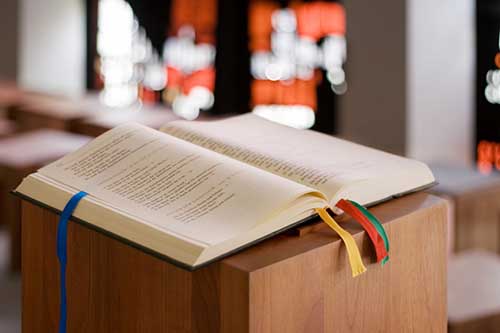
In a recent online discussions, people expressed outrage that some verses were left out of the Revised Common Lectionary reading from the Book of Revelation.
Some of the discussions about the origin of the shared Three Year Lectionary got to levels of deprecation such as:
I know where the 3-year lectionary comes from. The Vatican (Fr Bugnini & the gang of Masons around him, to be precise), gave us the Novus Ordo as well, all of that work utterly cursed, & its creators surely doomed to a long afterlife of penance (if they dodge the hellfire)
Twitter
In the disapproval of the Three Year Lectionary, some argued that there was more scripture read in the previous, traditional, one-year cycle. Others argued that the problem with the Three Year Lectionary is that there is too much scripture read – so that people could not hold this in their ongoing memory. Some contended that in the one-year cycle, each Sunday had a coherent theme holding together all the readings from the scriptures and the collect (clearly false). Some saw the one-year cycle as sourced in the saintly Jerome. Others thought the one-year cycle could be improved by adding a First Testament reading and that doing this makes it better than the Three Year Lectionary. Others argue that there is no historical precedence for a multi-year cycle, ignoring that Jews have been using a three-year sabbath lectionary for centuries.
I would join the fray by noting that
- The Sunday Eucharistic lectionary is not the appropriate place to have the intention to read through the whole Bible
- One hour a week (or for many “committed Christians” now, once or twice a month) is not able to bear the weight of our full spiritual nourishment
- It is not helpful for the Sunday Eucharist to be tightly themed with every reading and prayer constricted to this theme – there might be a focus (Christmas; Easter;…) but people come with a variety of personalities, needs, and hopes, and most should be addressed most of the time
Vatican II, the source of the Three Year Lectionary, expressed the hopes for the lectionary well:
The treasures of the bible are to be opened up more lavishly, so that richer fare may be provided for the faithful at the table of God’s word. In this way a more representative portion of the holy scriptures will be read to the people in the course of a prescribed number of years.
SACROSANCTUM CONCILIUM 51
Liturgy is action accompanied by interpreting words – in the case of the scriptures, the Word of God, in the liturgy, the recounting and celebrating of the great acts of God.
Why use the Lectionary?
A lectionary provides whole churches or denominations with a uniform and common pattern of biblical proclamation.
A lectionary serves as a guide for clergy, preachers, church members, musicians, and Sunday school teachers that shows them which texts are to be read on a given Sunday.
A lectionary provides a guide and resource for clergy from different local churches who wish to work and pray together as they share their resources and insights while preparing for their preaching.
A lectionary serves as a resource for those who produce ecumenical preaching and worship resources, commentaries, Sunday school curricula, and other devotional materials.
A lectionary provides a guide to individuals and groups who wish to read, study, and pray the Bible in tune with the church’s prayer and preaching. Some local churches print the references to the following Sunday’s readings in their bulletins and encourage people to come prepared for the next week’s celebration.
A lectionary also shows us the relationship of the readings of one Sunday with those that come before it and after it. Within each of the major seasons of Lent, Easter, Advent, and Christmas-Epiphany, the flow and missional purpose of the season is reflected in the Scripture texts selected for each Sunday.
The Revised Common Lectionary (RCL)
*****
General Introduction to the Lectionary
Introduction to the Revised Common Lectionary
Comparing lectionaries before and after Vatican II
Augmented traditional BCP lectionary
If you appreciated this post, do remember to like the liturgy facebook page, use the RSS feed, and sign up for a not-very-often email, …




Thank you Bosco, as usual you provide a sane and judicial perspective. One thing we had in the past whne evening services were quite common (before TV) was the opportunity for a series of sermons on atopic or book. I don’t know where the readings came from or if it was the preacher’s choice but we were certainny exposed to more Scripture than is generally the case today.
Thanks, Janet. In a way, then, the Bible was a shared, overarching story for our culture. TV picked that role up for a while. Now, young people barely see a TV – this means there’s no overarching story for us all together any more. Blessings.